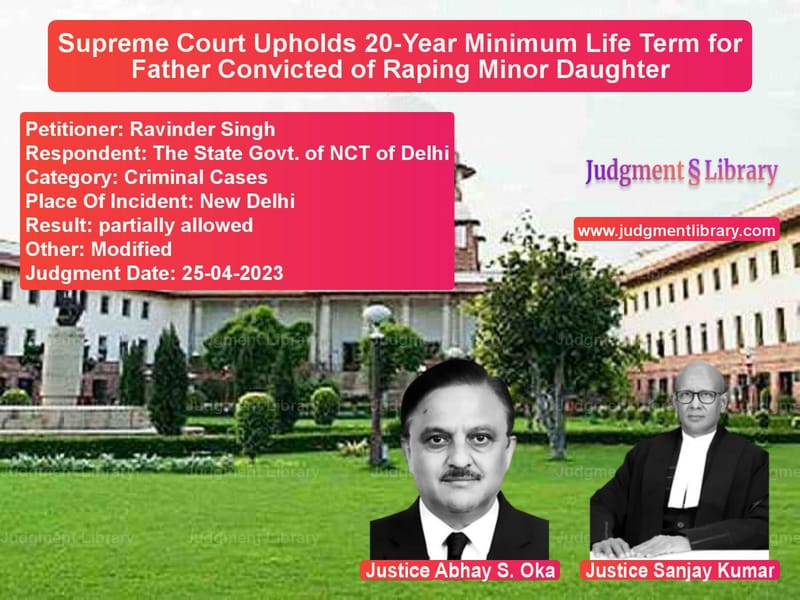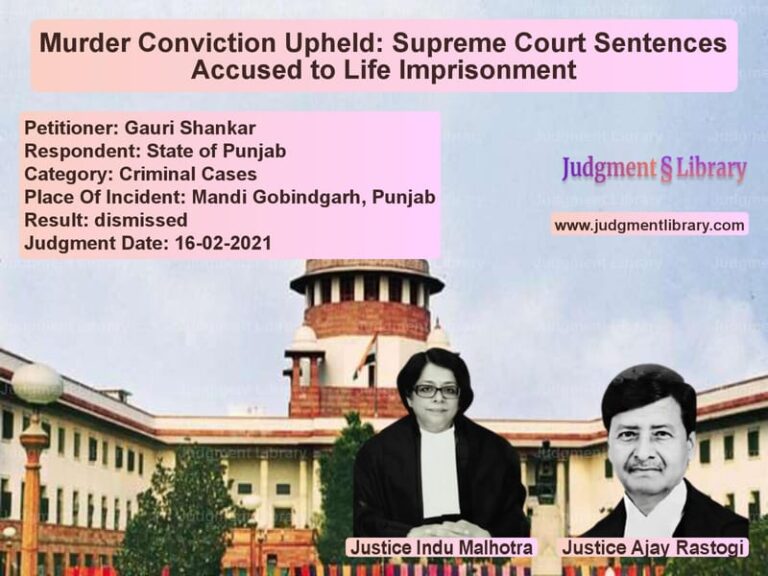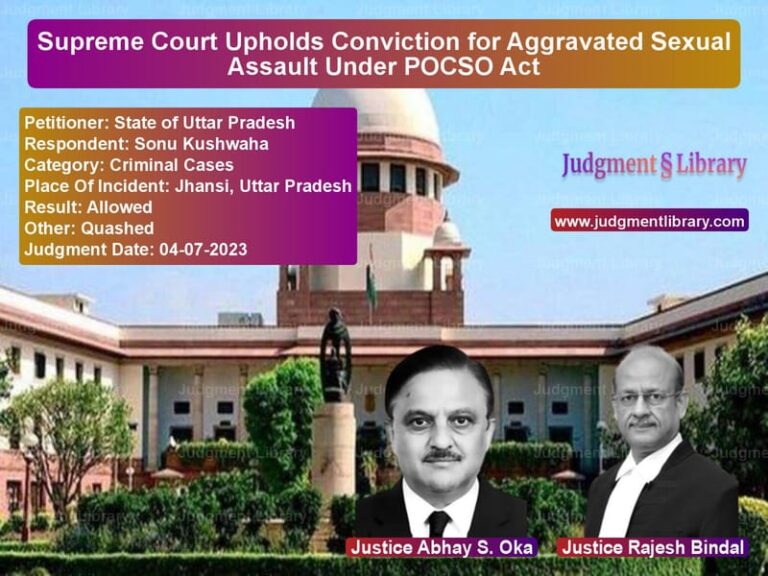Supreme Court Upholds 20-Year Minimum Life Term for Father Convicted of Raping Minor Daughter
The Supreme Court of India recently ruled on a disturbing case of sexual violence involving a minor, where the appellant, Ravinder Singh, was convicted for raping his own 9-year-old daughter. The case, which was heard under the Criminal Appellate Jurisdiction, raised critical legal questions regarding sentencing and the authority of lower courts to impose minimum life imprisonment terms.
The appellant was convicted by the Additional Sessions Judge (Special Fast Track Court), Dwarka Courts, New Delhi, under Sections 376, 377, and 506 of the IPC. The trial court sentenced him to life imprisonment and directed that he should not be granted any clemency until he had served at least 20 years in jail. The Delhi High Court upheld this ruling. However, the Supreme Court was approached under Article 136 of the Constitution, limiting the review to the sentencing aspect of the case.
Case Background and Sentencing
The appellant was found guilty of raping his 9-year-old daughter in August 2012. The trial court imposed the following punishments:
- Life imprisonment under Section 376 IPC, with a fine of ₹25,000.
- Life imprisonment under Section 377 IPC, with a fine of ₹25,000.
- Rigorous imprisonment for 2 years under Section 506 IPC, with a fine of ₹10,000.
- The court ruled that he must serve a minimum of 20 years before being eligible for clemency.
Arguments Before the Supreme Court
Petitioner’s Arguments
Mr. Sudhir Naagar, representing the appellant, argued that the trial court exceeded its jurisdiction by imposing a mandatory 20-year imprisonment term before remission could be considered. He contended that only the High Court or Supreme Court had the authority to impose such conditions.
Read also: https://judgmentlibrary.com/ndps-act-conviction-overturned-supreme-court-acquits-harbhajan-singh/
Respondent’s Arguments
Ms. Sonia Mathur, appearing for the State, defended the sentence, citing precedents where the Supreme Court had upheld longer minimum sentences in cases of heinous crimes. She referenced landmark cases such as Swamy Shraddananda v. State of Karnataka and Union of India v. V. Sriharan, which allowed courts to impose a longer fixed-term life sentence.
Supreme Court’s Observations
Understanding Life Imprisonment
The Supreme Court reaffirmed that, in law, life imprisonment means incarceration for the remainder of a convict’s natural life. However, in practice, life imprisonment is often interpreted as 14 years due to the remission provisions under Section 433 Cr.P.C.
Judicial Precedents Supporting Fixed-Term Sentencing
The court cited several cases supporting the principle that courts can impose fixed-term life imprisonment:
- Swamy Shraddananda v. State of Karnataka: Recognized the need to prevent automatic remissions in serious crimes.
- V. Sriharan v. Union of India: Held that courts could impose life sentences with a minimum fixed term.
- Gouri Shankar v. State of Punjab: Ruled that trial courts could impose life imprisonment for the remainder of the convict’s life.
Final Judgment
The Supreme Court ruled that the trial court lacked the authority to impose a minimum 20-year life sentence. However, recognizing the gravity of the crime, the Court exercised its special powers to modify the sentence, stating:
“The ends of justice would be sufficiently served if the life imprisonment of the appellant is for a minimum of 20 years of actual incarceration before he can seek remissions.”
Thus, while the Supreme Court acknowledged that the trial court had overstepped its jurisdiction, it upheld the minimum 20-year term, ensuring the appellant serves at least two decades behind bars before being eligible for any form of clemency.
Impact of the Judgment
This ruling underscores the judicial system’s commitment to protecting children from sexual violence and ensuring that offenders face severe consequences. By affirming a minimum 20-year life sentence, the Supreme Court has set a precedent for dealing with heinous crimes against minors, emphasizing that leniency should not be granted in such grave offenses.
Petitioner Name: Ravinder Singh.Respondent Name: The State Govt. of NCT of Delhi.Judgment By: Justice Abhay S. Oka, Justice Sanjay Kumar.Place Of Incident: New Delhi.Judgment Date: 25-04-2023.
Don’t miss out on the full details! Download the complete judgment in PDF format below and gain valuable insights instantly!
Download Judgment: ravinder-singh-vs-the-state-govt.-of-n-supreme-court-of-india-judgment-dated-25-04-2023.pdf
Directly Download Judgment: Directly download this Judgment
See all petitions in Bail and Anticipatory Bail
See all petitions in Juvenile Justice
See all petitions in Judgment by Abhay S. Oka
See all petitions in Judgment by Sanjay Kumar
See all petitions in partially allowed
See all petitions in Modified
See all petitions in supreme court of India judgments April 2023
See all petitions in 2023 judgments
See all posts in Criminal Cases Category
See all allowed petitions in Criminal Cases Category
See all Dismissed petitions in Criminal Cases Category
See all partially allowed petitions in Criminal Cases Category







